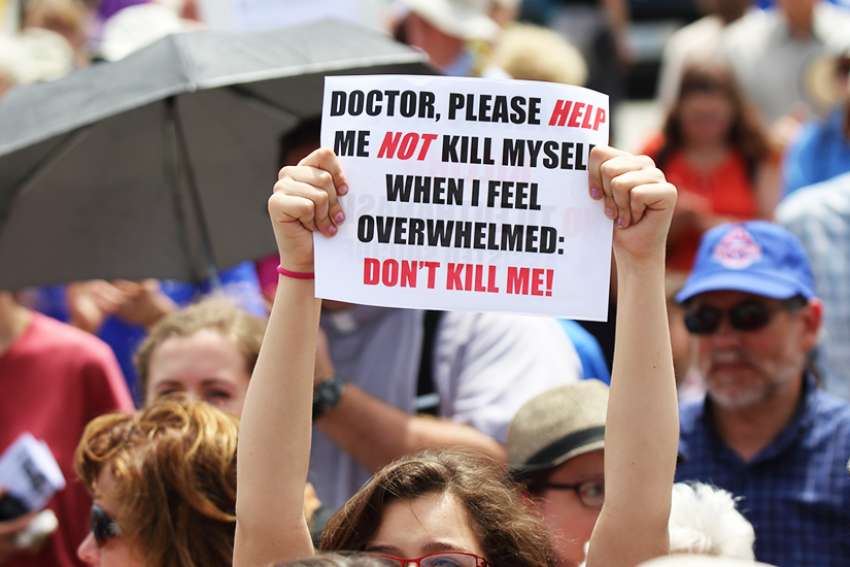A woman holds up a sign during a rally against assisted suicide in 2016 on Parliament Hill in Ottawa, Ontario. Canada is projected to exceed assisted suicide and euthanasia deaths in the Netherlands and Belgium.
CNS photo/Art Babych
Assisted suicide on the rise in Canada, report shows
By Deborah Gyapong, Canadian Catholic News
OTTAWA – Euthanasia and assisted suicide deaths in Canada could soon exceed the rates of such deaths in Belgium and the Netherlands, warns the Euthanasia Prevention Coalition.
Medically induced deaths rose by 46.8 per cent in the second half of Canada’s first year of legalized euthanasia and assisted suicide, according to an interim report released by Health Canada Oct. 6.
The report said 1,179 “medically assisted deaths” occurred between Jan. 1 and June 30 this year, accounting for 0.9 per cent of all deaths in Canada during that time period. In the previous six months, following the legalization of so-called Medical Aid in Dying on June 17, 2016, there were 803 deaths.
The total number of assisted deaths climbed to 2,149, including deaths that took place in Quebec since Dec. 10, 2015, when Quebec’s own law came into effect.
Health Canada reported the euthanasia and assisted suicide figures are in line with those of other jurisdictions where assisted death is legal.
Alex Schadenberg, executive director of the Euthanasia Prevention Coalition, said on his blog, however, the number “is high when compared to Belgium where there was 235 reported assisted deaths in the first year (2003); 349 in the second year and 393 in its third year after legalization.” Belgium’s population is about one third of Canada’s.
“Based on the number of reported assisted deaths, it is possible that Canada will quickly surpass the Netherlands and Belgium,” he said.
Also, the Canadian figures could be much higher than those reported, he warned.
“Canadian governments have established a self-reporting system, meaning the doctor who carries out the death is the same doctor who reports the death (no oversight of the law), therefore it is possible that under-reporting and abuse of the law occurs,” Schadenberg wrote.
The vast majority of Canada’s assisted deaths involved the deliberate killing of a patient by a health professional, usually a physician. Only five cases of assisted suicide were reported where the lethal drugs were self-administered.
The average age of those euthanized was approximately 73, the Health Canada study reported. The most common underlying condition prompting the request for death was cancer (63 per cent), consistent with findings in other jurisdictions, the study said.
Other underlying conditions included neuro-degenerative illness and circulatory/respiratory illnesses.
Health Canada reported a slight increase (eight per cent) in assisted deaths taking place outside a hospital setting.
Canada is the only jurisdiction in the world that allows nurse practitioners to administer euthanasia drugs. The Health Canada report shows there were fewer than seven cases of nurse practitioners involved in assisted dying in the first six-month period, but the number rose to 38, or 4.3 per cent, in the second six-month reporting period. The increase may have been helped by Ontario’s passing legislation to allow nurse practitioners to prescribe controlled substances, the report said.
Please support The Catholic Register
Unlike many media companies, The Catholic Register has never charged readers for access to the news and information on our website. We want to keep our award-winning journalism as widely available as possible. But we need your help.
For more than 125 years, The Register has been a trusted source of faith-based journalism. By making even a small donation you help ensure our future as an important voice in the Catholic Church. If you support the mission of Catholic journalism, please donate today. Thank you.
DONATE

